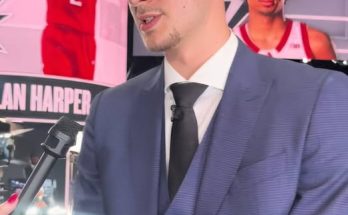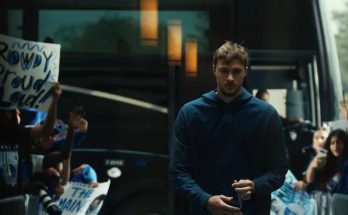The Dallas Cowboys have found themselves at the center of one of the most talked-about and emotionally charged storylines of the NFL season following the explosive news that star linebacker Micah Parsons has requested a trade. This development has sent ripples through the league and left fans, analysts, and insiders speculating about the future of one of the game’s most dynamic defensive talents. At the heart of the Cowboys’ response stands the team’s owner and general manager, Jerry Jones, whose comments in the wake of the trade request have been notably cryptic, adding fuel to the ongoing debate and uncertainty surrounding Parsons’ status.
Micah Parsons, a player who has rapidly risen to superstardom since entering the league, has become an indispensable piece of the Cowboys’ defensive puzzle. Drafted in the first round in 2021, Parsons quickly showcased a rare combination of speed, strength, and instinct that few players at his position possess. His unique versatility allows him to excel as a pass rusher, run stopper, and even in coverage, making him a nightmare for opposing offenses and a cornerstone of Dallas’s defensive identity. His performances earned him multiple Pro Bowl selections and the Defensive Rookie of the Year award, setting the stage for what many expect to be a Hall of Fame-caliber career.
However, despite his on-field success and importance to the franchise, news broke that Parsons had submitted a formal request to be traded. Such a move by a player of his stature is rare and naturally generates considerable attention. The reasons behind the trade request remain somewhat unclear, as Parsons and the Cowboys have offered little in terms of detailed public explanation. Speculation ranges from contract disputes and disagreements over team direction to possible personal friction within the organization. The lack of clarity has left fans and media alike eager for answers, intensifying scrutiny on the Cowboys’ management, and particularly on Jerry Jones, whose leadership and decisions will ultimately shape the resolution of this crisis.
Jerry Jones, known for his larger-than-life personality and hands-on approach to team management, has always been a central figure in Dallas Cowboys news. He is famously protective of his players and proud of the team’s legacy, often taking an active role in roster decisions and public communications. However, following Parsons’ trade request, Jones has chosen a more guarded stance. His remarks have been characterized by ambiguity and careful phrasing, refusing to provide concrete updates or to comment directly on the possibility of a trade. This approach has only heightened the mystery surrounding Parsons’ future and has led to widespread debate about the reasons behind the owner’s measured public posture.
At press conferences and interviews, Jones has acknowledged the seriousness of the situation but declined to speculate or reveal the team’s internal strategy. His cryptic responses suggest a desire to keep negotiations and discussions private, protecting the interests of both the franchise and the player. Jones’ reputation as a shrewd negotiator and savvy businessman indicates that the Cowboys are likely engaged in behind-the-scenes efforts to resolve the matter in a way that balances competitive goals with player relations and financial considerations.
One key aspect of Jones’ silence may be linked to the timing and leverage inherent in trade discussions. Publicly confirming Parsons’ trade request or revealing negotiation details could undermine the Cowboys’ position in potential deals, diminish their bargaining power, or alienate Parsons further. In professional sports, especially in the NFL, managing information is a critical component of maintaining team control and optimizing outcomes. By remaining cryptic, Jones might be attempting to maintain an upper hand, signaling to trade partners and league executives that the Cowboys are not desperate, while also signaling to Parsons that the franchise is serious about its stance but willing to listen.
The trade request also places pressure on the Cowboys’ front office to weigh complex decisions. Parsons is one of the best defensive players in the league, and losing him would be a significant blow to the team’s competitiveness and defensive schemes. On the other hand, trading him could bring in valuable draft picks, young talent, or financial flexibility that might help build a more balanced roster. The Cowboys must navigate these competing priorities carefully, factoring in fan sentiment, locker room morale, and long-term strategic planning.
For the fans, the situation is fraught with frustration and confusion. Parsons is a fan favorite, a symbol of the Cowboys’ renewed hope on defense, and a player who has delivered highlight-reel plays that energize the stadium and the franchise. His trade request feels like a betrayal to many, though others understand the realities of professional sports where contracts, playing time, and personal ambitions often collide. The silence and cryptic messaging from Jerry Jones leave fans in suspense, unsure if the star linebacker will don the iconic star on his helmet next season or be playing elsewhere.
The media landscape around the trade request has been saturated with rumors and speculation. Some insiders suggest that the Cowboys might be looking for a package that includes high draft picks and promising young players, signaling that the team wants to capitalize on Parsons’ high market value. Others report that conversations remain in early stages and that no trade is imminent, emphasizing the complexity of finding a suitable partner willing to part with valuable assets. Jones’ cryptic comments have done little to confirm or deny these rumors, instead fueling further discussion.
Meanwhile, Micah Parsons himself has maintained a relatively low public profile regarding the trade request. Unlike some players who take to social media or public statements to air grievances or influence negotiations, Parsons has chosen to keep his cards close to the chest. This approach could be interpreted as maturity and professionalism, suggesting that the linebacker prefers the matter to be resolved privately rather than through public drama. It also complicates the narrative for fans and media, who are left piecing together the story from indirect hints and unofficial sources.
The NFL, as a whole, watches closely when a star player requests a trade, especially one as impactful as Parsons. Trades involving marquee players can shift the balance of power within the league, create ripple effects in multiple team rosters, and impact playoff projections. The Cowboys, a franchise steeped in tradition and with championship aspirations, cannot afford to make a hasty or poorly considered decision. Jerry Jones’ guarded communication style indicates that the front office is taking a cautious, strategic approach to this unprecedented challenge.
It is worth noting that the Cowboys have faced high-profile player issues in the past, and Jerry Jones has often been at the center of managing them. His experience navigating complex personnel decisions and media scrutiny is well known, which lends credibility to the idea that the team’s silence and cryptic messaging are deliberate tactics. Jones understands the stakes and appears intent on controlling the narrative, preserving the franchise’s public image while working to find a resolution behind closed doors.
Looking ahead, several scenarios could unfold. The Cowboys could reach a reconciliation with Parsons, convincing him to remain with the team through a contract extension or other incentives. Alternatively, a trade could be consummated, sending Parsons to a new team eager to add a defensive star. Such a move would undoubtedly reshape the Cowboys’ defense and impact their competitive outlook. Lastly, there is the possibility of an ongoing standoff, where Parsons remains with the team under strained circumstances, a situation that could affect locker room dynamics and on-field performance.
The complexity of the situation is compounded by the evolving nature of player empowerment in the NFL. Modern athletes have more tools and platforms to influence their careers and public perception, and trade requests are becoming more common as players seek control over their professional destinies. Jerry Jones, while a traditionalist in many respects, must adapt to this new reality and balance his authoritative role with the demands of player agency.



